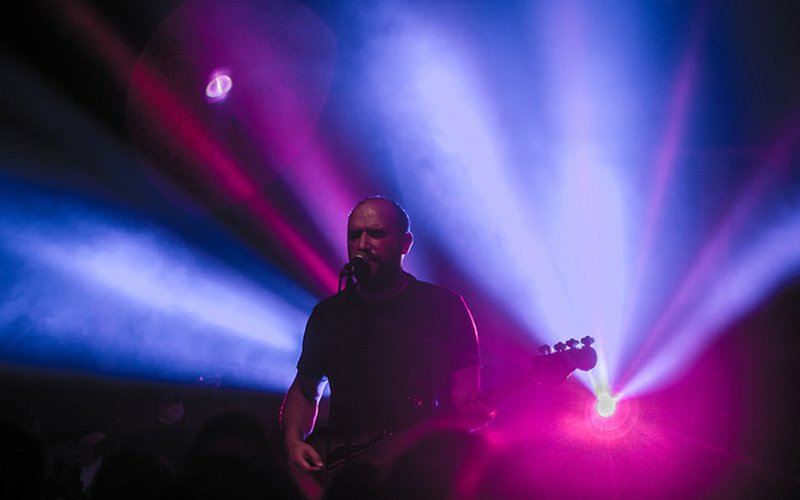
The harsh cold air bites at my hands as I walk toward the Tractor Tavern to see Pedro The Lion play their first Seattle show in 11 years. The harshness of freezing breeze turns my thoughts to Pedro The Lion's "The Longest Winter." "In time memories fade, senses numb," the young David Bazan sings on the chorus. "One forgets how it feels to have loved completely." That song is written from the perspective of an older man giving a young man romantic advice, but the generational narrative makes me think what today's Bazan might say to Bazan at the end (or for that matter, the beginning) of Pedro The Lion. Have his senses numbed to the notion of revisiting his most well-recognized and misunderstood projects? Have his bad memories that kept him from using the moniker faded away?
A Pedro The Lion "reunion," never really seemed plausible because... well, it's really just Bazan and whichever friends were happy to help him flesh out his live band. Yet, here we are. As a Bazan die-hard who never got a chance to see Pedro The Lion, catching all three nights of the band's Seattle shows didn't just feel like a good time -- it felt necessary. I'd been warned that the setlists weren't going to vary much from night to night, but it didn't matter. This had to happen. Walking through the doors of the Tractor, I was greeted with a rush of warm air and a room full of mopes like myself all following that same compulsion. All three shows were sold out, packed with fans who've been hungry for this moment. Bazan has been playing shows under his own name all these years, but nothing matches the excitement that was palpable in that room. Exuberant chatter bounced off the walls after Advance Base's appropriately melancholy set on that first night. Then the lights dimmed and the band walked on the stage.
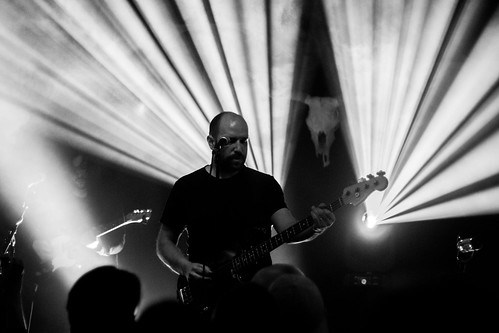
Pedro The Lion's reintroduction to Seattle comes, appropriately, with a scathing political indictment. Opening with "Slow and Steady Wins the Race," Bazan seized the moment to re-contextualize the song for modern times, changing the heavenly visions in the lyrics from "I'll receive a mansion on the river Jordan" to "I'll receive a mansion right next to Steve Bannon." Brilliant beams of white light jetted out from behind the three-piece band as he sang these lyrics, making it clear that isn't just a reunion for the sake of reuniting -- Bazan still has things to say and the Pedro moniker gives him the platform to do it.
Bazan is an artist that warrants "reading into" whatever he does. Intentionality ruminates in all of his records, so how could homecoming Pedro shows not do the same? Quickly the songs began to feel like movements as "Slow And Steady" seamlessly transitioned into Control's "Indian Summer," in which I'm pretty sure I heard Bazan tweak the line "It should do wonders for the GNP" to "GOP." Even if he didn't, the consumerist takedown of the rest of the song's lyrics implied it. Then another kicker comes with "When They Really Get To Know You They Will Run," once a playful attack on superficiality now plays as a grim warning about the toxic masculinity that was exposed on a mass scale in 2017 (this theme came up a bunch over the three days, more on that later). And right away, things began to take focus. A Pedro comeback without Bazan's biting commentary emanating through wouldn't really be Pedro at all. It was a project that constantly railed against the borders that were projected on it. If you forgot how combatitive Pedro could really be, Bazan and his band were here to shut down that thought.
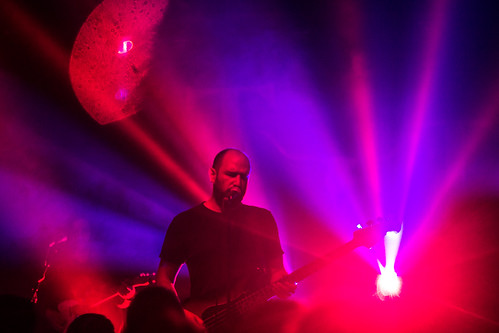
Bazan emphasizes this ethos with the deepest cut of the night, "Nothing" off the Whole EP. Hearing "Nothing" was a shock. Whole is the biggest outlier in Bazan's discography, feeling like one of his most outwardly Christian works with songs like "Lullaby" and an instrumental track just called "Hymn" (which, to be fair, totally rips. People don't talk enough about how consistently excellent Bazan's guitar tone is). But like everything with Bazan, it's all in the lyrics. "Nothing" feels like a thesis statement in retrospect, one that he's stayed remarkably close to despite the many personal revelations and tribulations he's gone through over the two decades since that EP dropped.
"It's very obvious that your ideals are not for me," he sings. "You'll tell me what to do, but you will see that I do as I please." Years before he'd ever get flack from Christian music stores for swearing on his records or called out for drinking vodka on stage at the Cornerstone Festival, he was telling all of that he didn't really give a shit about what we think. He's going to go about it how he wants. This show was already proving to echo that sentiment and we're only a few songs in. He even followed the track with the drunken recollections of "Keep Swinging." Hearing songs from the first and last Pedro releases back to back helped paint the picture of just how much he really changed over those years -- and that's all before we get to the solo works.

The band blitzed through the set each night, with most of the songs serving as somewhat medleys that oozed together. Bazan has never sounded so vital, rumbling through these old tunes on his bass guitar. And really, they felt like a band. This wasn't the "original" line-up and T.W. Walsh was only there in the iconic lyrics of "Bands With Managers," but you couldn't tell me this wasn't a band and not a solo guy testing out full arrangements. These songs were meant to be played this way, even the slow-burn bummers. But there was more than a couple carryovers from Bazan's years doing it alone. This first became clear as he opened up the crowd to ask questions between songs, which is a trademark of his solo shows.
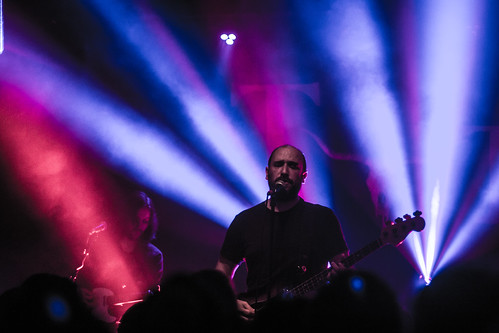
The band was so locked in that over the course of three nights the only thing that really changed was the questions the audience asked. Even some of the responses to songs were eerily similar from night-to-night. Everyone swooned when the band started to play "Criticism As Inspiration." People cheered when he started to play "Options" and heads bobbed in rhythm to the dirge of "Second Best." But those questions, and subsequent ally Bazan's responses, could change the tone of the evening and reveal more of Bazan's intentions in the set list.
The questions on the first night weren't so fruitful. Mainly people called out requests, with the most interesting tidbit being Bazan noting that he's working on a rewrite of "Secret of the Easy Yoke." It didn't diminish the evening whatsoever, but it didn't necessarily accent anything other, "Holy shit, can you believe we're at a Pedro The Lion show?" On the second night, one question began to topple the previously established status quo of the segment.
"What are you doing to smash the patriarchy?" a woman shouted from somewhere in the crowd. Bazan's face was undeterred, always ready to "go there." He responded, and I'm paraphrasing here, that other than playing songs he sees the importance of men like himself sitting down and letting women take the lead -- particularly women of color. He briefly touched on the swath of sexual assault allegations made against powerful men since the Harvey Weinstein revelations and the #metoo campaign, saying that men need to be careful and not to commit these vile acts, calling these men "sad."

During the first Q&A on night three, Bazan gave a preface that he'd be doing an experiment by only having women ask questions for the evening. In a room mostly dominated by males, there was a long pause where previously voices were clamoring to get their wishlist songs heard by the band. Bazan even joked that boyfriends were going to be feeding questions about Control for their girlfriends to ask. But what ended up happening was much more remarkable. The questions raised in the final of the trio of performances were the best of the three. It was the only day in which someone actually asked why the reunion was happening. Bazan paraphrased the question, which was along the lines of, "You're an artist who's always pushing forward, so why look back?" It's the type of straight-shooting that Bazan thrives and revels in, explaining how looking back the Pedro material helped him find a stable place to push out art and gave him access to certain tones and moods that he kept himself from since ending the project. Later, another woman would ask about Bazan and his wife's parenting philosophy (which he said is more ad hoc than anything, other than "if you make a mistake, you don't want to make it again.").
Questions like these really helped open the door that Bazan always leaves unlocked. It was easy to get lost in the celebratory feeling of these shows, of seeing your favorite band again. But the women in the audience helped steer the conversation back to the plot. These aren't just songs that we've lived with and loved over the years. They're documents of a changing philosophy and creed, recollections on poison in culture, and prophecies of atrocities we're seeing to manifest in our world today. There's a natural impulse to cheer when you hear your favorite song. But there's also a pretty odd dichotomy seeing people clank their beers to a song like "Options" that outlines a loveless marriage or the admonishment of greed on "Penetration."
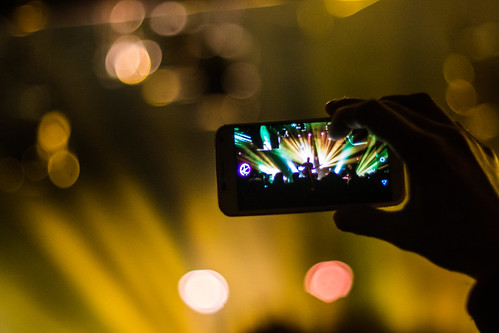
And so the questions changed, but the show went on as it had the previous two nights. However, the context had changed. When he played the set of songs spanning "Magazine," "Second Best," "A Mind Of Her Own", and "Priests and Paramedics," the messages of toxic masculinity were even more pronounced. All those songs prominently featured powerful men doing band things. The songs sound so good that it's easy to forget what Bazan is trying to tell us. And as much as Bazan gets pinned as a downer, he ends that particular set with an astounding message by reworking his Blanco solo-cut "Trouble With Boys." Golden lights shot out behind the band as Bazan howled a message, "You are worthy of love."
Pedro The Lion is back. But Bazan is not the same. He was never the same on any of those old records, either. Even the songs that weren't rewritten or re-arranged felt different. It'd be a disappointment if they didn't. Following Bazan's music has always been about taking this journey with him. The world has changed, he has changed, and we have changed. My thoughts turn again to "The Longest Winter" and that same line: "In time memories fade, senses numb. One forgets how it feels to have loved completely." I think I had it wrong walking into that room. This wasn't about what it meant for Bazan to go back, it was more what we as his audience are taking from this now. It's a more complex notion as well. Do you try to hold on to the old memories of a band like this, one you've "loved completely?" Or do you accept that you've both changed? I think there's more beauty to explore in the latter.
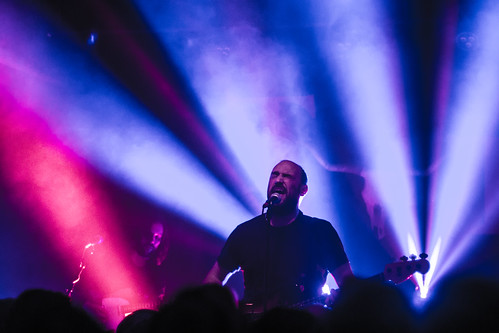
Set List (for all three nights):Slow and Steady Wins the RaceIndian SummerWhen They Really Get to Know You They Will RunNothingKeep SwingingTranscontinentalForegone ConclusionsCriticism as InspirationOptionsI DoPenetrationKept SecretsMagazineSecond BestA Mind of Her OwnPriests and ParamedicsTrouble With Boys
Encore:Of Up and Coming MonarchsBig TrucksGod Rest Ye Merry Gentlemen (Friday only)Bands With Managers
Throwaway Style is a weekly column dedicated to examining all aspects of the Northwest music scene. Whether it’s a new artist making waves, headlines affecting local talent, or reflecting on some of the music that’s been a foundation in our region; this space celebrates everything happening in the …
It's hard to believe, but it's been nearly six years since Little Big Show first started. A collaborative effort between KEXP, Starbucks, and STG Presents, Little Big Show has hosted 19 different shows at The Neptune that pair renowned artists with arts organizations throughout Seattle. On Saturday…